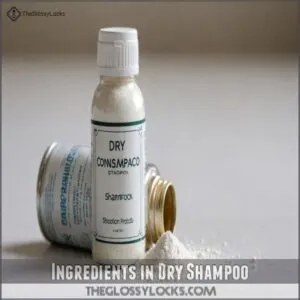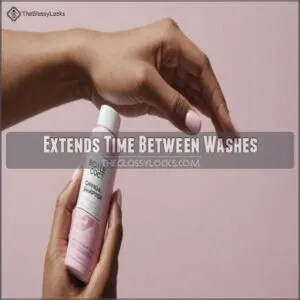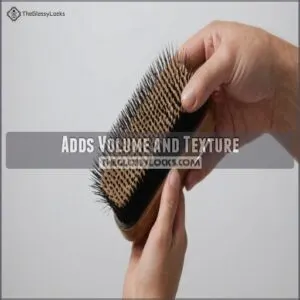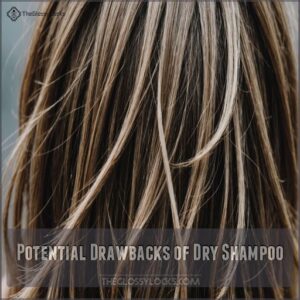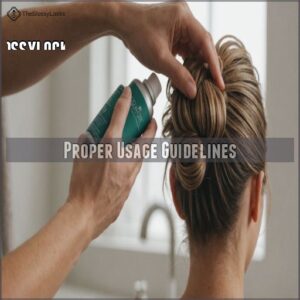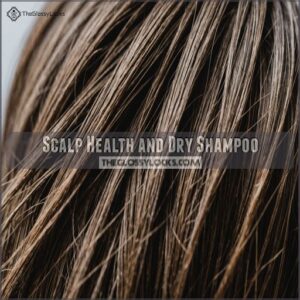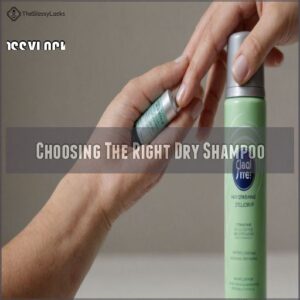This site is supported by our readers. We may earn a commission, at no cost to you, if you purchase through links.
 Wondering if dry shampoo is your hair’s new best friend?
Wondering if dry shampoo is your hair’s new best friend?
It can be, especially if your scalp gets oily quicker than a slippery walnut!
Dry shampoo‘s perfect for extending time between washes and zapping oil in a pinch, just like magic dust.
However, overuse might lead to build-up, irritation, and even breakage.
So, while dry shampoo‘s great for a quick fix, you’ll still need to schedule those regular washes—like checking your phone battery.
Balance is key!
Curious about how to keep your scalp healthy and avoid pitfalls?
Stick around—we’ve got the full scoop on getting the best from your dry shampoo.
Table Of Contents
- Key Takeaways
- What is Dry Shampoo
- Benefits of Using Dry Shampoo
- Potential Drawbacks of Dry Shampoo
- Proper Usage Guidelines
- Scalp Health and Dry Shampoo
- Choosing The Right Dry Shampoo
- Frequently Asked Questions (FAQs)
- Is dry shampoo good for your hair?
- Does taking hot showers dry out hair?
- What makes a good dry shampoo?
- Why do people use dry shampoo?
- Does dry shampoo feel good on the scalp?
- Can you use dry shampoo with regular shampoo?
- Is it better to use dry shampoo or wash your hair?
- Is it safe to use dry shampoo on your hair?
- How often should you use dry shampoo?
- What are the pros and cons of dry shampoo?
- Can dry shampoo be used on color-treated hair?
- Does dry shampoo help with hair volume?
- Is dry shampoo suitable for sensitive scalps?
- How often should I replace my dry shampoo?
- Are there natural alternatives to commercial dry shampoos?
- Conclusion
Key Takeaways
- Dry shampoo’s great for a quick fix, extending time between washes and adding volume, but overuse can cause buildup and irritation.
- You shouldn’t use dry shampoo every day; aim for two or three times a week, adjusting based on your hair type and scalp’s reaction.
- To avoid scalp problems, you should always follow dry shampoo use with regular washing to remove product buildup and maintain a healthy scalp.
- Before using a new dry shampoo, do a patch test to check for any allergic reactions.
What is Dry Shampoo
Dry shampoo is a waterless hair product that helps your hair look cleaner by absorbing oils with ingredients like starch or alcohol.
It’s perfect for those days when you’re in a hurry and really don’t have time for a full wash, allowing you to skip that dreaded greasy hair look.
Definition and Purpose
Explore the world of dry shampoo, your hair’s knight in sparkling armor.
It quickly absorbs oil, leaving locks looking fresh without a drop of water.
Ideal for a busy schedule, it offers a temporary fix for oily hair.
Use it for:
- How it works
- Oil absorption
- Hair freshening
- Temporary fix
- Hair care
Ingredients in Dry Shampoo
So, what’s in dry shampoo, you ask?
It usually contains starch or alcohol to help soak up the hair oil.
You can even buy dry shampoo starch for DIY dry shampoo.
You’ll often find common additives like fragrances for a fresh scent.
Curious about natural alternatives?
They’re out there for ingredient safety!
Always keep an eye out for potential allergens to protect your hair health from damage.
Benefits of Using Dry Shampoo
When you’re short on time, dry shampoo can be your hair’s best friend, extending the time between washes and keeping your locks looking fresh.
It also adds volume and texture, making it a handy tool for those busy mornings when you’re rushing out the door.
Extends Time Between Washes
Ever wish you could extend that fresh hair feeling?
For those struggling with oily locks, check out specialized oily hair products designed to tackle excess oil.
A dry shampoo routine stretches the time between washes, a blessing for oily hair types and busy schedules.
By absorbing excess oil, dry shampoo keeps your hair feeling clean and cuts down on wash frequency.
Add it to
Adds Volume and Texture
Because of its unique properties, dry shampoo can work wonders for your hair.
It adds volume and texture, especially beneficial for those with fine or oily hair.
It can even extend the time between washes, reducing the frequency of hair washing, as seen with popular options for dry shampoos for Asian hair.
You’ll notice a noticeable lift at the roots, giving your hair a fuller, bounc
Convenient for Busy Lifestyles
Using dry shampoo effectively can be maximized when paired with its complement, dry conditioner, which reduces frizz instantly. Amp up your morning routine with dry shampoo.
It’s a quick hair fix for busy lifestyles.
No time? No problem.
With this time-saving trick, you can skip a wash without sacrificing style.
Perfect for a last-minute on-the-go refresh when you’re dashing out the door.
Busy day essential, indeed!
Keep your hair care routine convenient and efficient.
Potential Drawbacks of Dry Shampoo
While dry shampoo can save you time and effort, it’s not without its flaws, like causing scalp irritation and dryness if overused.
Remember, balance is key: too much can disrupt your scalp’s health, making your hair more prone to breakage.
Can Lead to Buildup and Irritation
You’ve noticed your scalp feels itchy or your hair looks flat? Blame dry shampoo overuse.
It might seem like a lifesaver but over time, it can lead to product buildup, scalp health risks, and irritation symptoms.
Regularly using dry shampoo without a thorough cleanse can clog hair follicles, causing issues that a scalp detox treatment at home can help resolve.
These tiny particles
May Cause Dryness and Breakage
Ever feel like dry shampoo might be doing more harm than good? It can cause dryness and hair breakage because of its alcohol content.
Here’s what to watch out for:
- Dry shampoo ingredients can zap moisture.
- Hair type impact varies drastically.
- Alcohol effect weakens hair strands.
- Styling tool risk heightens the damage.
So, choose wisely!
Overuse Can Disrupt Scalp Health
While dryness and breakage might already have you wary, overusing dry shampoo can upset your scalp’s delicate balance.
Imagine clogged pores leading to scalp irritation, or worse, dandruff and seborrheic dermatitis.
Hair washing isn’t just ceremonial; it’s key for removing product buildup.
For healthy hair and scalp, consider moderation and make sure regular cleaning happens to prevent follicle clogging and potential hair damage.
Proper Usage Guidelines
To get the best out of your dry shampoo, it’s important to know when and how to use it properly, ensuring your hair stays fresh and healthy.
Applying sparingly and complementing with regular washes are key to avoiding pesky buildup and keeping your mane in top condition.
Frequency of Use
Think of dry shampoo as a helpful friend, but not a replacement for regular hair washing.
Overuse can lead to product buildup and scalp irritation.
For most, using it two or three times a week is ideal.
However, if you have oily hair, you might need to use it more often.
Those with dry hair should use it less frequently.
Listen to your hair—if your scalp feels itchy or irritated, cut back!
Finding the right balance is key to keeping your hair and scalp happy and healthy.
Application Techniques
Mastering dry shampoo application keeps greasy hair at bay.
Shake well, then spray on roots six inches away.
Don’t forget root targeting for even product distribution.
Section hair like a pro for better coverage.
Let it sit to absorb oils, then fluff with fingers for a quick hair refresh.
Always check for pesky residue before heading out.
- Shake the can well
- Spray from six inches away
- Focus on roots
- Let it sit, then fluff
- Check for residue
Complementing With Regular Washing
Balancing dry shampoo with regular washes is key for keeping your scalp happy.
Think of dry shampoo as your backup player, stepping in only when needed.
Considering your hair type and lifestyle, such as having dry hair that requires washing every 2-3 days, will help you determine the best approach. Embrace your unique hair type to decide your washing frequency.
A consistent shampoo routine refreshes your hair and scalp, while hair products and tips help bridge the gaps, keeping dryness at bay.
Scalp Health and Dry Shampoo
Keeping your scalp healthy is essential, as it supports the overall condition of your hair.
By understanding how dry shampoo affects your scalp, you can avoid common pitfalls and maintain a happy head of hair.
Importance of a Healthy Scalp
While proper usage is key, a healthy scalp is pivotal for overall hair health.
Dry shampoo can’t replace washing, so make sure your scalp stays happy.
Here’s why it matters:
- Dandruff Prevention: A clean scalp means less flakiness.
- Irritation Avoidance: Prevent itchiness and discomfort.
- Healthy Hair Growth: Encourages strong, luscious locks.
Remember, your scalp needs love too!
Signs of Scalp Issues
Noticing scalp issues? You’re not alone. Signs include itching, redness, and flaking—often worsened by overusing dry shampoo. These pesky symptoms can also hint at dryness or even hair loss, all crying out for better scalp care. Here’s a handy guide:
| Issue | Possible Cause | Tip |
|---|---|---|
| Dryness | Overuse of dry shampoo | Try alternating methods |
| Itchiness | Product build-up | Rinse thoroughly |
| Flaking | Dandruff | Use anti-dandruff shampoo |
| Redness | Irritation | Consult a dermatologist |
| Hair loss | Follicle clogging | Reduce product frequency |
Maintaining Scalp Health
A healthy scalp, which is characterized by scalp itchiness indicating growth, is essential for vibrant hair growth.
Keep your scalp clean by washing with shampoo regularly, not just relying on dry shampoo.
Using dry shampoo in moderation and choosing the right formula, such as those with oat milk or keratin ingredients, can help maintain a natural oil balance, preventing scalp irritation.
Incorporate simple scalp hygiene tips like gentle massaging during washes to boost blood
Choosing The Right Dry Shampoo
Choosing the right dry shampoo is key to getting the best results.
Consider your hair type – oily, fine, thick, etc. – and look for formulas designed to address your specific needs.
Always do a patch test first to check for any sensitivities.
Considering Hair Type and Needs
A healthy scalp keeps your hair happy, but don’t forget to factor in your hair type.
Look for these specifics when checking out best dry shampoo options.
- Oily hair: Seek a formula labeled “oil-absorbing.”
- Dry hair: Watch for hydrating ingredients.
- Curly hair: Opt for a lightweight brand.
- Color-treated hair: Choose a formula that’s gentle on color.
Patch Testing for Sensitivity
Trying a patch test is a smart move when exploring dry shampoo.
Dab a little on your arm, wait a day, and see if there are any skin reactions.
This small step can prevent bigger woes like allergies.
Check the ingredient list, too—especially in alcohol-based dry shampoos.
This way, you keep hair cleaning fun and irritation-free!
Frequently Asked Questions (FAQs)
Is dry shampoo good for your hair?
Is dry shampoo your hair’s best friend or a fleeting ally?
It absorbs oil, making hair look fresh.
Yet, overusing it can dry out your scalp, cause irritation, and is no substitute for traditional washing.
Does taking hot showers dry out hair?
Hot showers can indeed dry out your hair.
The high heat strips natural oils, leaving hair more brittle and prone to breakage.
Try cooler water when rinsing to help maintain your hair’s moisture and health.
What makes a good dry shampoo?
A good dry shampoo absorbs oil without leaving residue, smells fresh, and adds volume.
It’s gentle on your scalp, won’t clog pores, and matches your hair color.
Choose one formulated for your hair type!
Why do people use dry shampoo?
People use dry shampoo to quickly freshen up hair without washing.
It absorbs oil, adds volume, and extends blowouts.
Perfect for busy mornings, it keeps your hair looking great without the fuss, even when you’re on the go.
Does dry shampoo feel good on the scalp?
Picture your scalp as a sponge that can feel both refreshed or irritated.
Dry shampoo can feel nice, giving you that just-washed feeling, but overuse might lead to itchiness or dryness, so moderate its use.
Can you use dry shampoo with regular shampoo?
You can mix dry shampoo with regular shampoo, but don’t replace washes.
Use dry shampoo to extend time between washes, then clean your scalp with regular shampoo to remove buildup and maintain healthy hair.
Keep it balanced!
Is it better to use dry shampoo or wash your hair?
Dry shampoo is convenient for skipping washes, absorbing oil, and adding volume.
It lacks real cleansing.
For a fresh start, washing with wet shampoo removes buildup and keeps your scalp healthy.
Choose based on your hair’s needs.
Is it safe to use dry shampoo on your hair?
Dry shampoo is generally safe for your hair, but moderation is key.
Overuse can lead to scalp irritation, dryness, and clogged pores.
Try using it sparingly, and always follow it up with regular washing.
How often should you use dry shampoo?
A wise person once said, "Everything in moderation."
Use dry shampoo sparingly—no more than two days in a row.
This keeps your scalp healthy and reduces build-up.
Overdoing it can lead to irritation and dryness.
What are the pros and cons of dry shampoo?
It’s a lifesaver for bad hair days, adding volume and extending time between washes.
However, overuse can dry your scalp, so use it sparingly.
It’s not a replacement for regular washing!
Can dry shampoo be used on color-treated hair?
Ever thought that color-treated hair couldn’t handle dry shampoo?
Surprise! You can totally use it, just be gentle.
Pick one designed for dyed hair to minimize fading.
It helps maintain your vibrant look while absorbing excess oil.
Does dry shampoo help with hair volume?
You can definitely boost your hair’s volume using dry shampoo.
It absorbs the oils, adding texture and lift to your locks.
Just sprinkle, massage, and enjoy that fresh bounce—without the fuss of a full wash!
Is dry shampoo suitable for sensitive scalps?
If you’ve got a sensitive scalp, dry shampoo mightn’t be your best friend.
It can irritate, clog pores, or even lead to a rash.
Always check for allergens and use sparingly to avoid issues.
How often should I replace my dry shampoo?
Imagine your dry shampoo stash dwindling faster than a phone battery on TikTok.
Replace dry shampoo every few months to keep freshness and effectiveness.
Pay attention to any expiration date and signs of unusual odor or texture.
Are there natural alternatives to commercial dry shampoos?
Try natural alternatives like cornstarch or arrowroot powder, as they absorb oil and freshen hair.
Just sprinkle a little on your roots, massage it in, and you’re good to go!
Enjoy clean hair without chemicals.
Conclusion
Imagine this: you’ve hit snooze one too many times, and your scalp’s shining like a disco ball.
That’s where dry shampoo saves the day!
It can extend the time between washes, keep your locks looking fresh, and add some volume.
But remember, overdoing it could harm your scalp and strands.
Balance matters.
Keep in mind the potential downsides and stick to a routine that suits you, and you’ll find that dry shampoo can indeed be good for your hair.


